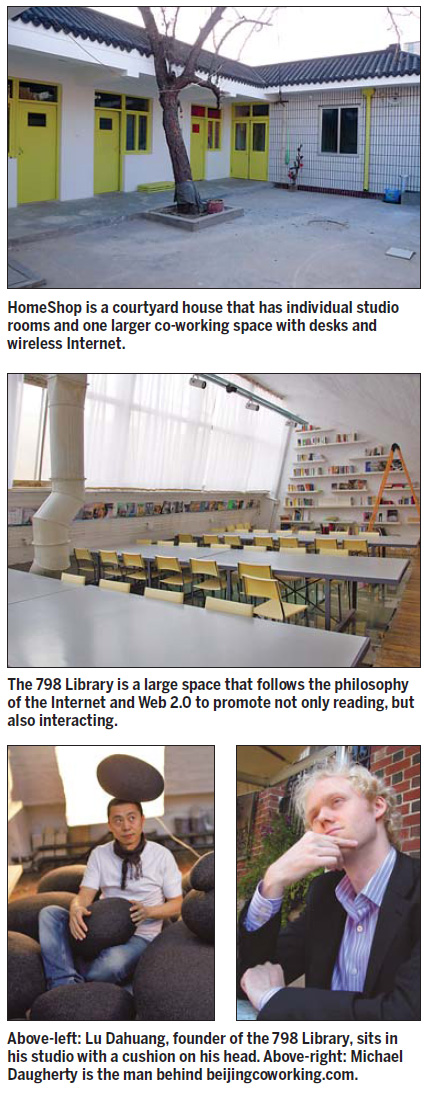
|
The HomeShop space, close to Beixinqiao subway station, is a haven for creative collaborators. Photos Provided to China Daily |
Until recently, Beijing has mostly lacked the facilities for the growing number of people who work on their own or in small groups, without regular offices, but who see the social and inspirational value of working alongside like-minded people.
Co-working is one solution to this need. In Beijing there is now a handful of such spaces or groups, which have grown up over the past year offering facilities and community to the capital's telecommuters.
Although a popular option abroad, co-working has only taken off sustainably in China in recent times.
Shanghai's xindanwei.com blazed the trail, launching in 2009. Beijing's 798 Library space followed suit in 2010, with the group beijingcoworkers.com.
In January of this year, artist-run space HomeShop launched its own offering, suggesting that this way of working has tapped into a reliable audience and is reaching a level of maturity in Beijing and the country as a whole.
In a backstreet behind Beixinqiao station, HomeShop provides individual studio rooms and one larger co-working space with desks and wireless Internet.
A shared kitchen and eating area encourages a community to build and there are spaces for small events or meetings, a growing library of books, tools and other items that can be borrowed.
HomeShop's founder Elaine W. Ho, from the United States, is enthusiastic about her creation.
"Amid white-collar communities, short-term office rentals have been quite a common phenomenon all over the world and in recent years, it's been common to see co-working spaces develop specifically geared toward creative communities," she said.
Ho describes her target audience as "independent artists, freelancers or beipiao (floating population)".
In her experience, collaboration is a crucial aspect to these people's activities.
"On one hand, setting up a formal structure to co-work is a means to share the financial burden," she said. "On the other, it provides the opportunity for different relationships to grow."
Located in the 798 Art Zone, 798 Library was launched by Lu Dahuang in May 2010 following his return to China after studying for a master's degree in digital publishing in Paris.
Lu describes the 798 Library as having connections to the Internet in terms of philosophy.
"Library 2.0 is an extension of the Web 2.0 concept," he said. "It's not only about reading but also about interacting."
With this concept, Lu said his focus is on Chinese contemporary arts media.
"798 Library works with our company WE-ME Inc as a database and a digital publishing platform," he said.
He predicts that in 2011, the Chinese public will increasingly get their digital content published on touch screens and mobile devices, such as tablet PCs or smartphones, and sees his project as a key supporter.
Another creative mind behind the co-working idea is Michael Daugherty, who set up beijingcoworking.com as "a semi-self-organized group of people who like to work together".
"We could all basically do our work online or at our homes, but we've realized we're more productive when we work together," he said. "We have a core group of four to five regulars who come to our co-working sessions and about 45 people on our e-mail list who come every now and again."
Every Sunday night, Daugherty sends out an e-mail to members with the schedule for the coming week.
"We don't charge a fee and we keep to a regular schedule, while also being open to trying new places," he said.
Most of their members are technology- and startup-based, but they also come from fields like graphic design or NGOs.
"We have members who are working on everything from a board game website to services for museums in China," Daugherty said, before adding that his group provides additional services.
"We offer special programs designed to help make progress on startups, such as an accountability group where we help people finish their goals, and an Inspiration Lunch, at which startup founders from around Beijing get together and talk about their experiences and projects," he said.
For HomeShop's Ho, co-working addresses the issue of the "precarious working identities" that are becoming more common in Beijing, paralleling issues of mobility, flexibility and the workers' networked identity.
"Organizing a co-working space, we hope to mobilize these elements in a way that should ideally benefit both us and others," she said. "A nice environment to work in, a supportive community and a sharing of resources, all in a convenient location."
